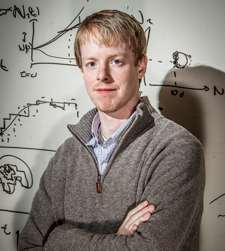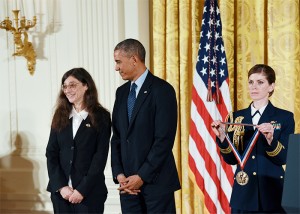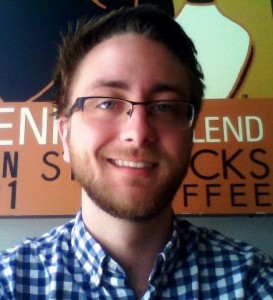 Thanks to our guest blogger, Matt Grobis, who is in his second year working toward a PhD in the Ecology and Evolutionary Biology department at Princeton, researching how groups filter noise from information in their environment (particularly predators) and how group membership affects how the whole group behaves. Matt earned his B.S. in IB in 2012.
Thanks to our guest blogger, Matt Grobis, who is in his second year working toward a PhD in the Ecology and Evolutionary Biology department at Princeton, researching how groups filter noise from information in their environment (particularly predators) and how group membership affects how the whole group behaves. Matt earned his B.S. in IB in 2012.
What I thought grad school would be like during college:
“Grad school is where you show up at noon, plan some experiments, run them the next day, then analyze the data. A PhD takes 5-7 years because it takes a while to plan the perfect experiment, one that hasn’t been done before and that answers a hole in the literature. During your first year, you do 5-6 experiments and publish at least one of them.”
When you’re doing lab reports during college, it’s almost guaranteed that the Discussion section will say something like “the study would benefit from more data.” We had three hours to do the lab; imagine how good the data would look if we had three weeks? Then, during your senior thesis, you continually imagine being able to do your research without juggling hours of lectures and homework at the same time. Grad school seemed like a big expanse of time to think about experiments, try them again and again until they’re perfect, and then publish. Any sub-perfect experiments were the fault of the experimenter not being motivated enough.
What I think grad school is like at the end of my 1st year:
“Grad school has cycles. Sometimes you show up at 10am, read articles all day, teach yourself R, and go home early. Sometimes you show up at 8am because you need to run three trials of experiments, and sometimes you swing by at 2pm because you were up until 4am writing revisions for a manuscript due to the journal that day. A PhD takes 5-7 years because literally everything takes longer than you think it will, and nothing works the first time you try.”
Something I didn’t quite grasp during my senior thesis and the beginning of the Fulbright was how much others had helped in making the experiment work out. It’s the difference between trying to find a store in a huge city you’ve never been in versus someone giving you a crude map and telling you roughly where the store should be. My advisor in college steered my thesis ideas towards a project that would answer a question regardless of what the results were, and my collaborator in Germany was the equivalent of a 4th-year PhD student in the U.S., meaning she’d had a lot of experience with figuring out the right way to do an experiment.
What my 1st year was like:
You frequently feel like you know nothing
An incredibly common feeling in grad school is “hm… I’m not sure how to do this.” The first reaction is to ask someone else, maybe an older grad student in the lab, or your friend who’s a lot better at R or Matlab than you are (hi, Sinead). You just don’t know the answer right now, so let’s find it and move on. For our generation especially, Wikipedia and Google make the answers to most of our questions separated by merely seconds from when we decide we want to find out. Grad school, on the other hand, is about constantly being in this zone of wanting to know an answer but not having it. That’s what research is; if we knew the answer, we’d have passed the info along to someone else (government organizations, the medical world, conservation groups, engineers, etc.) and be focusing on finding the answer to a new question.
As frustrating as it can be not knowing how to fit a quadratic curve on a scatterplot in R or who to e-mail for ordering new syringes for the lab, it is very satisfying the next time you have to do it and you know exactly how. And as you read more articles, go to more lectures, and talk with more people, you start seeing the same concepts reappearing… but this time, you understand them a little better.
You spend a long time figuring out how to find the answer to a question
Do you remember those “If you had a million dollars, how would you spend the money?” essay prompts in high school? One of the biggest hurdles I’ve had in planning experiments in grad school is getting out of this mentality of infinite money and time. You read about experiments where the authors make grandiose claims out of six data points and you vow to never publish something so ridiculous. If you’re going to do science, you’re going to do it right, even if it means fewer publications during your PhD. Your experiments will have at least 30 individuals, each assayed on multiple days to control for between-day variation in behavior, and each individual will be exposed to 5 treatment groups to see the full effect of the variable on behavior.
Those are fantastic intentions, and you can often make it work. But it’s really difficult. If you’re like me in college, “really difficult” sounds like something that applied to people who weren’t you; you’ve faced “really difficult” before and gotten an A in the class. Let me reiterate: it is really freaking hard to do this.
Here’s an example from this week: I’ve started a pilot experiment to figure out how the social environment affects how skittish a fish is in a new environment. The idea is to use 8 fish in 3 different groups of 60 fish. Due to poor planning, the videos ended up really dark, and it’s impossible to distinguish who’s who in the video. Not only can I not use the data; if it wasn’t for some quick thinking by marking all tanks where fish had seen the experimental tank, I might have had to scrap the experiment! (In animal behavior research, novelty to an environment is often extremely important.) So even though I’ve been planning these ideas for a few weeks, I nearly messed everything up within the first two days of actually doing anything. It always seems so obvious before you start, and then it never goes how you plan. (Above right is a video still from a trial I can’t use.)
But… that’s just how it goes. You can’t get to the end result without making mistakes. And you can’t make any progress if you don’t try.
You wait (a lot) for clearance to do research
Animal welfare committees are a crucial part of research by instituting ethical requirements for how research should be conducted. They ensure that the research has a bigger point and that your methods are the most humane way to get there (e.g. if mice have to be euthanized, what’s the calmest and least painful way for the animals? If the crickets suddenly start dying during the experiment, what do you do?). If you’re doing fieldwork, you need to get a license for the work; if it’s in another country, you probably need a visa as well.
Ensuring that research will be done properly takes a lot of time. Animal welfare committees have panels of both scientists and non-scientists to get a range of perspectives on the ethics of the work, which means extra time is needed to exchange and explain the reasoning for different viewpoints. For fieldwork, a lot of people want government approval for permits or visas, and there are only so many people reading the proposals. The only advice I can give on this is to start early, be patient, and be courteous with your e-mails. The waiting time (on the order of months) can really help refine your ideas for when you actually start.
You start to understand what makes for an interesting scientific question
For the first few months of grad school, I told people I was interested in how group composition affects predator evasion behavior in schools of fish. It took a lot of thinking and discussing with others to refine those ideas into a broader framework with more applicability than one species of fish under one type of predation risk.
You spend a lot of time thinking in grad school. Your ideas have to stand up to hundreds of hours of mental chewing; the best ideas are the ones that not only hold strong but also generate new ideas the more you learn about them.
——————————————————————————————————–
Doing research has been challenging but I’ve been really happy so far. It’s really quite amazing to be paid to think about and do experiments asking questions nobody in the world knows the answer to yet. I feel like the incredible amount of time stuck, trying to figure out an impasse, has taught me how to find the answers to things I don’t know. This mentality has given me a lot of confidence to approach things I might have shied away from before because it seemed too difficult (e.g. teaching myself linear algebra, taking a metro or bus in a country where I don’t speak the language, etc.). And most importantly, I constantly feel like I’m gaining a better understanding of how the world works, which only makes me more excited to see where grad school takes me.
-Matt
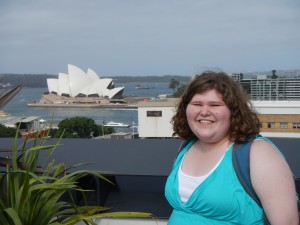

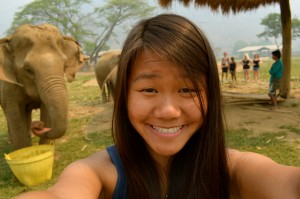
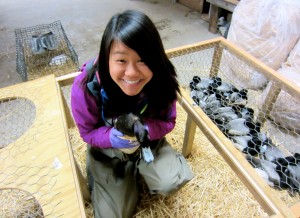 I started taking field courses in the States (IB 447 and NRES 285)
I started taking field courses in the States (IB 447 and NRES 285)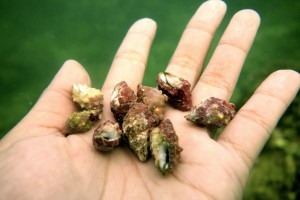 My study organism is Drupella cornus, a corallivorous marine gastropod. I am interested in seeing whether the gastropod chooses to feed upon a coral colony over another and whether the removal of the gastropod will have an effect in coral cover.
My study organism is Drupella cornus, a corallivorous marine gastropod. I am interested in seeing whether the gastropod chooses to feed upon a coral colony over another and whether the removal of the gastropod will have an effect in coral cover.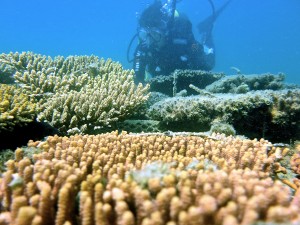 I was set back a few weeks because of a storm and gale warnings. Soon it was Christmas and everyone was gone for the holidays. Finally, after two months since my arrival and with the help from the lab aids, I was able to set up my experiment. Since then my experiment has been running smoothly.
I was set back a few weeks because of a storm and gale warnings. Soon it was Christmas and everyone was gone for the holidays. Finally, after two months since my arrival and with the help from the lab aids, I was able to set up my experiment. Since then my experiment has been running smoothly.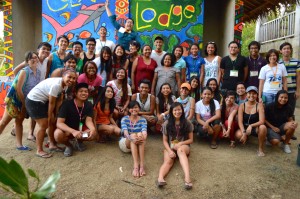 SEA Camp’s goal is to empower young seatizens as leaders in conservation. There were 30 participants, ages 18-23, from a diverse background ranging from university students to government workers. I was invited to give a talk on coral restoration and was a mentor to the participants with their project proposals on marine conservation. The camp was very well organized with resource speakers, workshops and other activities. I enjoyed seeing how excited the participants became when they had the opportunity to snorkel and scuba dive. It was amazing to see how motivated everyone was in saving the Philippines Seas.
SEA Camp’s goal is to empower young seatizens as leaders in conservation. There were 30 participants, ages 18-23, from a diverse background ranging from university students to government workers. I was invited to give a talk on coral restoration and was a mentor to the participants with their project proposals on marine conservation. The camp was very well organized with resource speakers, workshops and other activities. I enjoyed seeing how excited the participants became when they had the opportunity to snorkel and scuba dive. It was amazing to see how motivated everyone was in saving the Philippines Seas. I have been abroad for six months and only have three months left of my grant. I am extremely happy with my stay in the Philippines and am excited to see where I will be next. If you would like to contact me, feel free to send an email to
I have been abroad for six months and only have three months left of my grant. I am extremely happy with my stay in the Philippines and am excited to see where I will be next. If you would like to contact me, feel free to send an email to 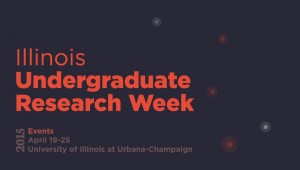
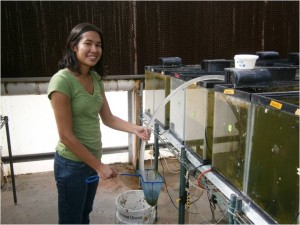
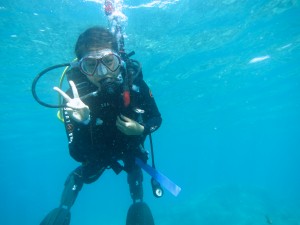 My name is Sally Feng. I graduated with a B.S. in Integrative Biology in May 2014. I am currently doing work on coral restoration in the Philippines under a Fulbright research grant. If you are interested in applying for a Fulbright, here is my experience.
My name is Sally Feng. I graduated with a B.S. in Integrative Biology in May 2014. I am currently doing work on coral restoration in the Philippines under a Fulbright research grant. If you are interested in applying for a Fulbright, here is my experience.
